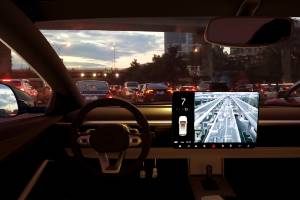Do Self-Driving Vehicles Decide Who Lives If a Crash is About to Happen?
 It may seem inevitable that we will all be using self-driving cars in the not-too-distant future. Approximately $80 billion is already invested in this technology. It is predicted there will be tens of thousands of semi-autonomous vehicles on the road in just a few years.
It may seem inevitable that we will all be using self-driving cars in the not-too-distant future. Approximately $80 billion is already invested in this technology. It is predicted there will be tens of thousands of semi-autonomous vehicles on the road in just a few years.
The hope is that these vehicles could prevent tens of thousands of crashes and save a lot of lives. Distracted driving would no longer be an issue because the people looking at their phones would not be the ones responsible for driving their cars.
Driverless cars can also return lost time to those who commute to work and provide more mobility for senior citizens, as well as those with mobility limitations.
However, are autonomous cars as safe as everyone seems to think? Will self-driving cars prioritize human life the way other human beings do?
For example, an article from USA Today lays out a situation where a self-driving vehicle would need to decide what to do when a crash cannot be avoided:
As a self-driving vehicle approaches an incline, a school bus veers toward it. The self-driving car does not have enough time to safely stop to avoid a collision, and the passenger does not have enough time to take control of the car. What will the self-driving vehicle do?
- Swerve into the trees on the roadside, which could save the people on the bus but potentially kill the driver of the car that was built to be safe?
- Swerve around the bus and into the lane of oncoming traffic, which may save the driver of the self-driving car, but possibly cause the bus driver to swerve into the trees, endangering the driver and other occupants of the bus?
- Collide with the bus, which may kill both the driver of the self-driving car and people on the bus?
What are self-driving cars programmed to do in these situations? Should the companies decide, or should the federal government set definitive guidelines for the entire nation?
No matter how the issue is regulated, manufacturers will likely need to program vehicles, so they know what to do to avoid a crash with a jaywalker, bicyclist or even a squirrel or other wild animal.
Those continuing to develop this technology will need to decide what objects self-driving vehicles identify and how to respond. Could this involve millions of computer simulations to try to prevent the car from killing anyone?
Will Fully Autonomous Vehicles be Error-Free?
You may think most or all the potential problems with driverless vehicles will be addressed before all vehicles on the road are fully autonomous. However, maybe the reason for some of the more recent crashes with semi-autonomous cars is that manufacturers are still figuring everything out.
Autonomous vehicles may not be able to prevent all crashes, particularly those related to human error.
For example, autonomous vehicles may have trouble avoiding some crashes with pedestrians. If a pedestrian darts out into the road, a human driver may be more likely to react and prevent a crash. Human drivers may think ahead of the emergency. For example, most experienced drivers know to slow down and take extra precautions in a school zone. How would a car know that? The car might only react after a child runs into the road.
Driverless cars may also struggle with prediction errors, such as misjudgments about the speed of other vehicles or speed when there are poor road conditions. Self-driving cars may not always react instantaneously to these situations.
If a bicycle rider suddenly veers into the path of an autonomous car, it may not respond quickly enough to avoid a collision.
Even those vehicles that have laser, radar and camera sensors make mistakes, according to Duke University robotics professor Missy Cummings. This is especially true in States with inclement weather such as Minnesota. Ice, snow, and rain all affect the laser, radar and camera technology.
Creating self-driving cars that drive just as well as people do is already a big challenge. These vehicles would need to be safer than cars with human drivers to deliver on the promises people have heard about autonomous vehicles.
Thousands of lives may be saved by this technology, but there will still be crashes, and people involved in these crashes will still suffer from injuries and other losses.
Were You in a Car Crash? Call for a Free Consultation
Our Minneapolis car accident attorneys may be able to help you seek compensation for damages. There are no upfront fees and you are not obligated to hire our firm to represent you.
Learn more about how we may be able to assist you in a free consultation. At TSR Injury Law, we have recovered millions on behalf of our clients. Our attorneys hold memberships in various legal organizations, such as The National Trial Lawyers Association and the American Board of Trial Advocates.
Give us a call today. No upfront fees. (612) TSR-TIME



